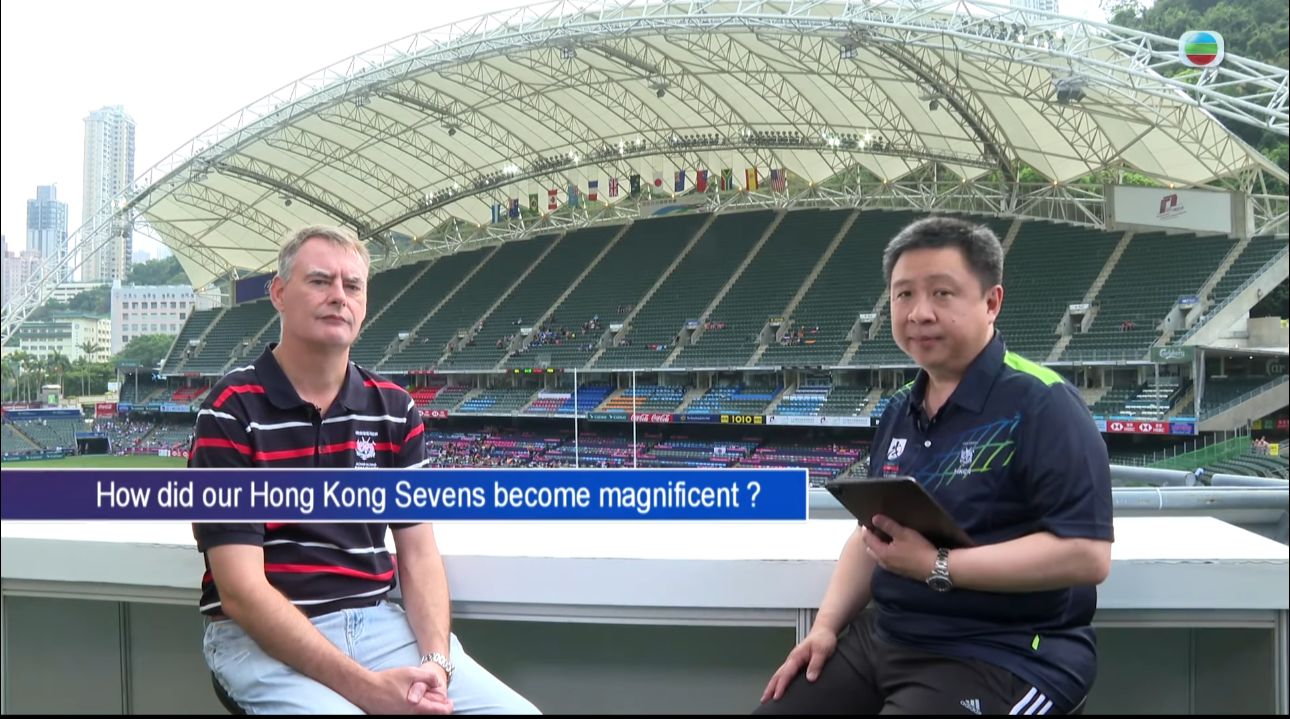
This week, Straight Talk is at the Hong Kong Stadium for the HK Rugby Sevens weekend, where Hong Kong Rugby CEO Robert McRobbie, former French Rugby Union player Benjamin Kayser and Hong Kong women team player Gabriella Rivers share with us their views on what makes the Sevens magnificent, and how the city itself, not just the actual sports, is making the event unique, and that they believe moving to the new stadium in Kai Tak will make the Hong Kong Sevens even more attractive.
Check out the full transcript of TVB’s Straight Talk host Dr Eugene Chan’s interview:
Chan: Good evening and welcome to another special edition of Straight Talk! I'm Eugene Chan, and I'm thrilled to have you all join us right here on the grounds of the Hong Kong Stadium, where the Rugby Sevens was held on the weekend. We will talk with the CEO of Hong Kong China Rugby, a former French rugby union player and a Hong Kong China women's rugby team member and get their take on how our Rugby Sevens became magnificent.
Our first guest is the CEO of Hong Kong China Rugby. Since 2017, Robert McRobbie has been recognized with an MBE for his philanthropy, and UK relations. Robbie is a true champion of using sports for social good. Welcome, Robbie!
McRobbie: Thank you, Eugene!
Chan: Good to have you. This 2024 Rugby Sevens event has been a tremendous success. And you told me earlier it has been like the 30th year in the Hong Kong stadium. But I'm sure it's gone way longer than that. Can you share with the viewers what's behind all these years of hard work?
McRobbie: Of course. The idea for the Sevens international tournament in Hong Kong first came up in 1976. Three chaps in a bar, where many good ideas are originated, decided that they wanted to host an international rugby competition. But to do it for 15-a-side rugby was very expensive – flights, hotels logistics. So, the idea was, why not use the shortened abbreviated form of the game, Sevens. Now, Sevens has a long history, but, to be honest, hadn't really captured the international imagination. So, to try and organize a tournament based on Sevens was a very novel idea. In 1976, the first one was held in the old Hong Kong Football Club, that football club is not where it is now. It was on the other side of the sports road. It was a very nice old ground that had a capacity of maybe two or three thousand people. But right from the word go, the tournament seemed to capture the vibe of the city and became very, very popular with international rugby. So, over the next few years, interest grew, the spectator numbers grew until it came to a point where actually Hong Kong Football Club could no longer accommodate the size of the competition. At that point then, they moved to the government stadium. And the government stadium, of course, is on the site of where we are now. But it's not this stadium, because in 1992, the government made the decision to shut down, to knock down the government stadium and build this magnificent new Hong Kong Stadium.
Chan: Right, Robbie, as you discussed earlier, this has been a regular sort of event until the pandemic, which we suffered for three years. And how are ticket sales going?
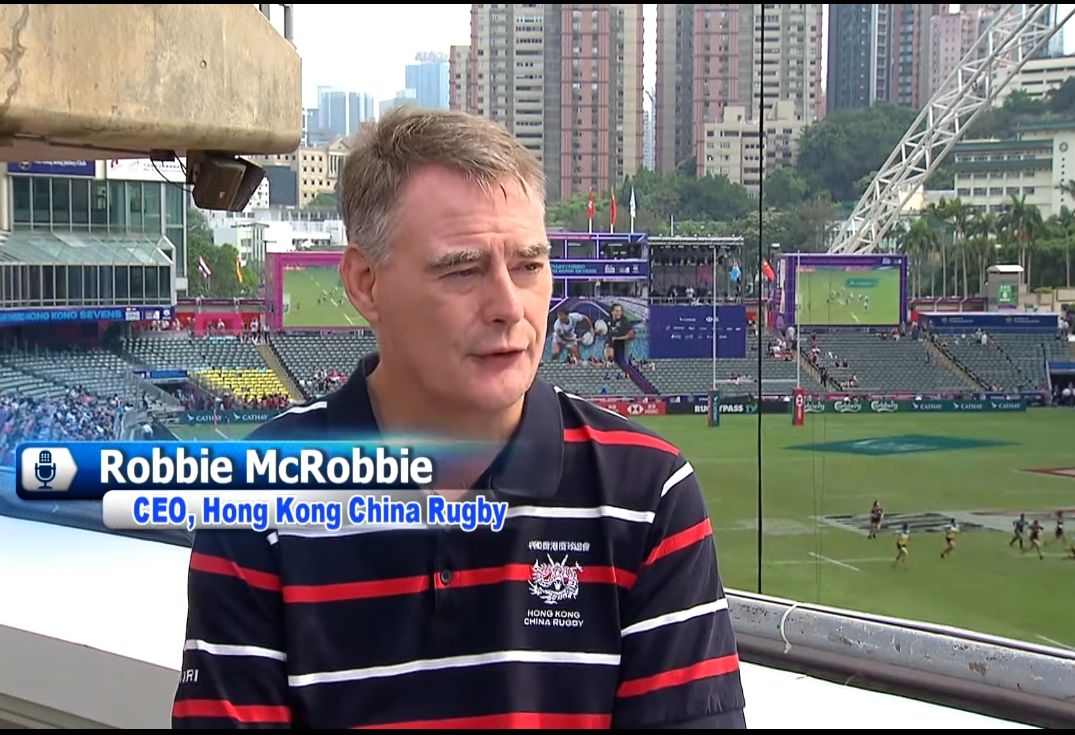
McRobbie: I'm so excited to say that last Thursday at 2:30 in the afternoon, we put up the sold out signs for the first time since 2019.
Chan: 40,000.
McRobbie: 40,000 people every day, so we sold three day tickets. So, you know, for us, that's such an important milestone for Hong Kong China Rugby, for our rugby community and for the city. We know we've had a number of years where there were no Sevens tournaments at all because of the pandemic. And then we came back with the first international tournament back in Hong Kong, just as the restrictions were ending, November 2022. We got 27,000 people which is really good, because there's still many new international travelers. Put forward to last year, up to 32,000. And the overseas travelers were starting to come back. And then we've worked really, really hard to re-engage with our traditional overseas fans, and get to the point where now this year, sold out.
Chan: Robbie, as I walked in, I see a lot of faces from all over the world, what will be the makeup between local and international travelers?
McRobbie: Because we now have an e-ticketing app, we're able to really accurately track where the purchases and the users of the tickets are coming from. Just by looking at the telephone number code. So far, with the public ticket sales, we know that 42 percent of purchases are from overseas. Now when we factor in the … because the corporate tickets go through central points and then get distributed. It takes us a little bit longer to really dig down into the data, but we expect that figure to hover somewhere between probably 35 to 40 percent overseas visitors.
Chan: Robbie, as you told us earlier, three years with no Rugby Sevens at all and looks like your finances must be tight at a particular time. So, how important is that success contributing to the development of the Hong Kong rugby team?
McRobbie: Absolutely critical. Ninety-five percent of our annual revenue comes from this tournament. Now we’re lucky going into the pandemic, because we had some very astute board members, some Scottish chartered accountants who had been our director of finance, and they've made sure that we went in with robust reserves in the bank. But as we went through COVID, we were eating up those reserves. And we knew that there was a fiscal cliff coming, which survival was really in question, if we had been able to not host the tournament for a further extended period of time.
Chan: Robbie, as you said earlier, that when it first started the Sevens wasn't that special, especially amongst the ones … or even in Hong Kong right? So, why is it so special about our Rugby Sevens in Hong Kong? What? Is it Hong Kong, the city? What makes it so special, in your view?
McRobbie: This is a really good question. I get asked about it a lot. I mean, I think we have to remember that. We're part of the world seven series. So, there's ourselves and seven other tournaments around the world. And the rugby content is basically the same. So, as much as rugby is fantastic, everybody enjoys watching the best teams in the world in action. I don't think it's rugby by itself, which makes our tournament so special. I think it is the city. I think when people come and experience Hong Kong, they remember … they've been before or they realize for the first time we've got so many wonderful positives. We've got an incredible transport system, the infrastructure, the logistics, amazing hotels, the vibrant nightlife, the bars, the restaurants, an amazingly safe city. So, I think that people love coming here, because they love outside of the stadium and exploring the city and enjoying themselves. I think that's really important. I think for people in Hong Kong, this event has become Hong Kong's Mardi Gras, it has become our carnival. So, the people of Hong Kong embrace it, they come here to have a good time. And they meet together with this amazing community of Hong Kong fans from all over the world. And that's a really, really exciting.
Chan: Let me ask you a direct question. I'm sure there are other Sevens events in the rest of the world. Do they have music and people are happy, like what they have in Hong Kong right now?
McRobbie: Sure, we share best practices so there's … you know, you'll see a lot of similarities in Dubai and Perth and Vancouver. But no one's got a south stand like we've got one.
Chan: Right, there isn't it.
McRobbie: Right behind us.
Chan: And I heard that there'll be a new decision or move this event to the new Kai Tak Sports Complex next year. What will be the... is it better Hong Kong or there'll be more challenges we will be facing?
McRobbie: It's absolutely better for us. I think we have to remember that as much as this Hong Kong stadium is beautiful, it's iconic, but it's 30 years old and behind the scenes is creaking. So, you know when you look at things like the changing rooms, we have 14 sharing one changing room, the media center, the overall facilities are very tired. Kai Tak Sports Park is state of the art and is one of the few stadiums in the world that's actually been built with Rugby Sevens tournament in mind. There are 24 changing rooms.
Chan: Twenty-four? Wow.
McRobbie: I think the experience for everybody, for the athletes, for the spectators, for the media, for the staff and the volunteers, will be huge.
It really will make Hong Kong even more attractive when you have all the state of the art facilities.
For sure, not just the Rugby Sevens I mean, Kai Tak has got to be a catalyst for the Hong Kong sports events industry. We have to embrace this opportunity to bring more events and build events into the likes of Hong Kong Sevens.
Chan: Will there be more plans to bring more rugby internationals to Hong Kong? Not just the Sevens?
McRobbie: We've got big plans, Eugene. Yeah, we love what we've created over the last four decades here. But we want to do more. We know our fans have got an appetite for it. We know people love coming to Hong Kong. So, why not? Let's bring more great events to populate Kai Tak Sports Park.
Chan: Robbie, I'm gonna ask you the last personal question. I know you've been on this post for like 20 years. Definitely not a short time and this will be your last year as the CEO of the Hong Kong Rugby Union. How do you feel? What will you want to share with the Hong Kong viewers? And also what would be your plan in the future and most importantly, what would be a good Hong Kong story to share with your mates in the UK?
McRobbie: For me I've had 21 fabulous years. I've been so lucky to work in Hong Kong, China rugby. We have an amazing community, a vibrant community. And I think we've achieved some great things. My successor has been named. He is a great guy, James Farndon, and I'm confident that he's going to take Hong Kong China Rugby in our community to even greater heights in the years ahead. Personally, Hong Kong is my home. I've lived in Hong Kong for more than 30 years. I'm staying in Hong Kong 100 percent. And I hope to be able to contribute still to the sports and events industry going forward.
Chan: Alright, thank you Robbie for all your hard work and let's take a break now but viewers stay tuned. We will be right back with more on the Hong Kong Sevens.
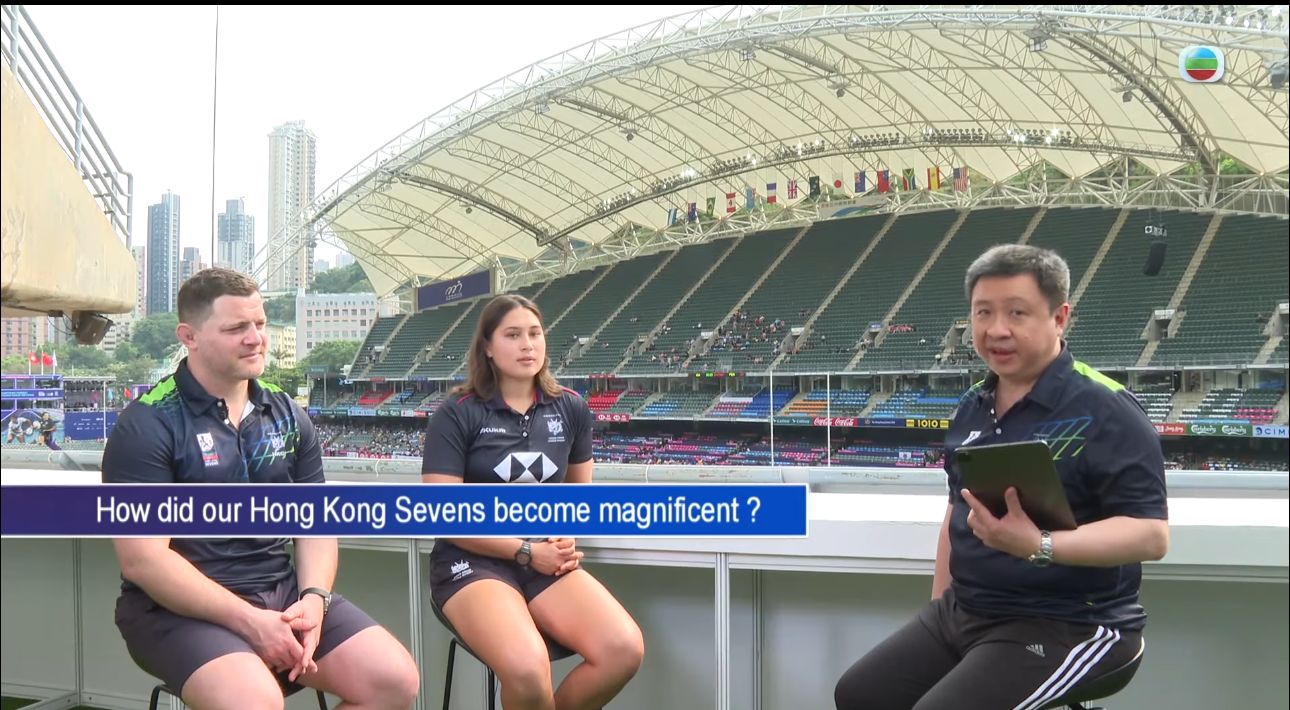
Chan: Welcome back to Straight Talk on how the Hong Kong Sevens became magnificent. Our next two guests are former French rugby union player Benjamin Kayser and Gabriella Rivers, a local rugby player representing Hong Kong this year in the seventh series. Benjamin has 16 years of national and international level championship experience, and is now a renowned TV commentator on international rugby. Welcome, Ben and Gabby!
Kayser: Thank you!
Chan: Ben, I know you have a bit of a Hong Kong connection. You told me you actually studied here. Can you share with us your Hong Kong story?
Kayser: In 1996, I was lucky enough for my dad's travels that brought us here. He was a consultant. And we lived here for a year and this is where I actually discovered rugby. I went to school at the French International High School and the PE teacher was Stuart Krohn, who was the number eight and captain of the Hong Kong Rugby Team. So, he took me down to Happy Valley Rugby Club. And that's why I discovered and fell in love with the sport.
Chan: Right? So, from then you became a French international player.
Kayser: Yes. Well, look, I was hooked by the brotherhood, the solidarity, the beauty of the sports using the big guys and the small guys. In French, we say the piano players and the piano movers. That's what you need in rugby. You need a bit of everything. And then it became my career. Yes.
Chan: Any memories that brought you back to your childhood days?
Kayser: Oh, a lot of them, a lot of them. I was actually here in 1996 as a ball boy. So, when I saw the kids, you know, doing the parade at 2 pm yesterday, that was me 27 years ago. So, it felt really close to my heart, special. Very, very fond memories.
Chan: Right, Gabby. You came to Hong Kong, I believe, when you were six?
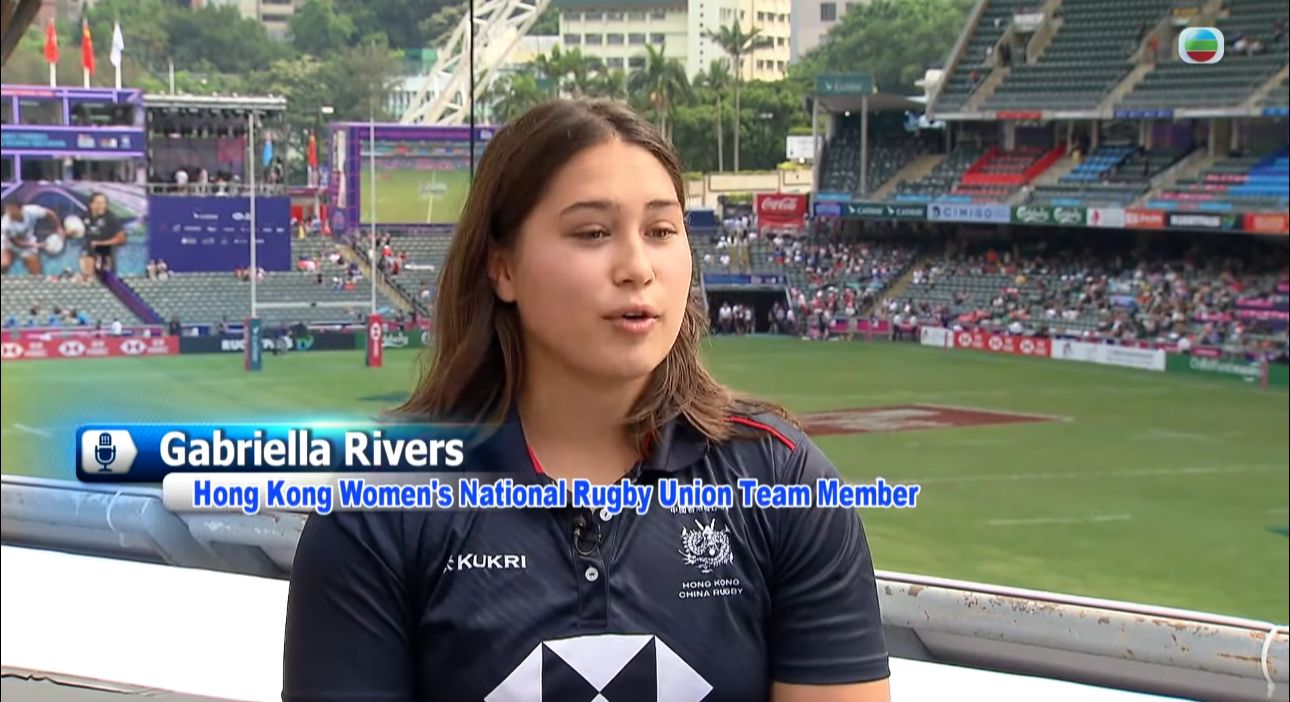
Rivers: Yes.
Chan: And then, you're now studying law at Bond University in Australia.
Rivers: Yes.
Chan: And now you're also playing for Hong Kong? So, can you tell us a bit about your training and how Hong Kong has actually helped you to develop rugby as a sport?
Rivers: The Hong Kong program has been really helpful with keeping me in the loop, but also allowing me to explore my interests outside of rugby. And so I went off to university in 2021. And every tournament that was important to the team, I came back and I trained as hard as I could. And it was my devotion to the team to continue to be involved regardless of my studies in Australia.
Chan: So, how do you feel to play in front of this crowd in Hong Kong?
Rivers: Oh, it's unbelievable. Forty thousand eyes watching and they're all cheering for you, supporting you. And I know, friends and families are in there cheering the loudest for me. So, yeah, it's unbelievable.
Chan: Right, Ben, as you said you have played for France and you've also been to the rest of the world. Why is it so special that Hong Kong Sevens attract so many fans? Why is it so “magnificent” as the word we use?
Kayser: I just think it's a unique blend of exoticism, a door to Asia but also, this is quite a heartwarming thing to know that you can travel everywhere in the world. But there's something that connects rugby fans. You like the social side, you like the rivalry on the pitch, you like the respect, you like the discipline, the drive, the mindset, the toughness. And when you come here, you find all those elements with an extra element of fun. I mean, the South Stand is just something absolutely unique in the world.
Chan: Right. So, you've been to other cities, they've got the Sevens, but Hong Kong is special.
Kayser: It's absolutely special. It's the one that everybody needs to tick as a player. It's a bucket list. And if you haven't really performed well in the Hong Kong series, then you haven't really done you know, your international in Sevens period.
Chan: So, Gabby, Rugby Sevens is known to be fast-paced, and also physically demanding. How would you say that from your side or from being a part of the Hong Kong team? How do we fit in the spatial scheme of things?
Rivers: I mean, the Sevens is such an intense sport, like you train all-year round to play 14 minutes of game time. So, I think in terms of fitness and speed Hong Kong up there, I think we just need more experience playing against the best of the world. And yeah, I think we could get there. Yeah, I think we really could.
Chan: Ben, you're familiar with our local and Asian teams, I'm sure. And what are your thoughts of the Hong Kong China Rugby, especially the women's team in the rest of the world's standards?
Kayser: We were speaking about it before the interview. Rugby Sevens, or women's rugby, is the fastest growing sport in the world, it really has this extra element of inclusion that rugby has to represent. So, seeing it, so embedded in the way that Hong Kong and Chinese rugby wants to go, I think it's tremendous. It's, they are role ... you don't want to know it, because you're very, very young, but you're a role model for young children, they will do it and they will understand it, rugby is a possibility for them, and they can thrive, they can have fun, they can perform, and they can, you know, get a crowd on their feet. So, I think it's brilliant.
Chan: So Gabby, you're now also a full-time student, how do you balance between training and studying and how do you cope with these challenges?
Rivers: I mean, we have a pretty young squad. So, I'm not the only student and the hard work that goes into doing both. It's a lot, but the coaches and management are really good at keeping us involved, but also allowing us the time to study as well. But it's about your own discipline, and your own responsibility and accountability to make sure that you thrive in both environments.
Chan: And then how do your parents support you in all this?
Rivers: Well, I've differing opinions from both my mom and dad, obviously. My mom really supports me education-wise, and my dad is probably my number one biggest fan in rugby. So, it's good having both my mom and dad support both aspects of my life as well.
Chan: So, Ben, you're back here now. After all these years, do you have the feeling, the crowd and having talked to young players, like Gabby, where do you see Hong Kong's rugby will be evolving from here? I mean, we're going have a new Kai Tak Stadium next year with more people be able to watch. How do you see Hong Kong Rugby being evolving, or even China in general?
Kayser: I genuinely don't understand how it can become better. So, if there's a new facility then I've seen only a glimpse of it, but it looks outstanding. It's … if they're going to move from such a unique gem of a stadium like this one is to get something even bigger, even more posh on the entertainment side. So, I'm really looking forward to coming back and to see how well they can do. And now if Chinese rugby wants to embrace and get even more attractions, I think it's a sensational thing that they should do. Because rugby is a school of life. Rugby is a way of uniting people. Rugby is a way of having discipline, but also having fun. And the more I see it, the more it really warms my heart to see that there're more countries that are picking up and embracing this love that we share for rugby.
Chan: Right, Gabby, could I ask you again, being a lady yourself. I mean, you look very feminine. And you're going to play in such a heavy-contact sport. So, is rugby a good sport for ladies, do you think?
Rivers: Yeah, absolutely. It's so much power and strength that you get from being in the sport and you learn so much about yourself and how much strength that you have. And I think it's a form of discipline to continue to train and push the boundaries regardless of what people think of you and what people think of women in this sport. Yeah, I absolutely love the physical aspect of it. It's probably one of my greatest attributes. You love it.
Chan: Have you ever got injured at all?
Rivers: Not really, I mean, my shoulders a few times, trying to hit above my weight but yes, no. I've been fortunate to avoid any serious injuries.
Chan: Ben, have you ever been injured? Because as a spectator, we see that it's a very heavy contact sport. Do people get injured often?
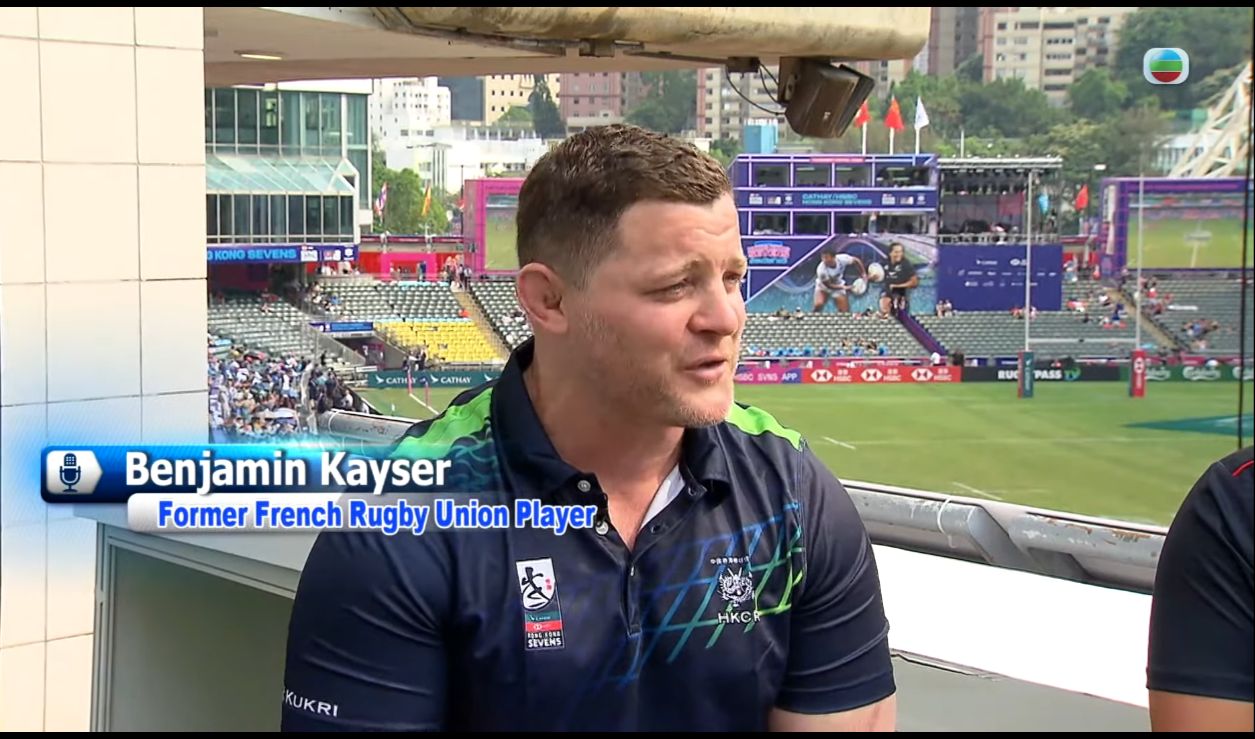
Kayser: Well, I think unfortunately, you're very young, touchwood. You're not but yes, I was injured many, many times. But look, it's part of rugby, you got to take care of yourself. I think as long as it's not, you know, the neck or the heads, then we just take the pain and take the love with it.
Chan: Right? You are playing for France and seeing the rest of the world, what would you recommend to the youngsters in Hong Kong who aspire to be like Gabby playing for Hong Kong one day? What would be your advice for them if they want to play international rugby one day?
Kayser: Well, funnily enough, I would advise Gabby to stick with her studies because it pushes you for extra discipline and extra mindset and an extra drive. And that's a great balance to have. So that rugby stays a passionate moment and just a pleasure, not something that you have to do something that you want to do. Let's just push them to embrace every single experience that is out there, travel the world, meet new people, test yourself by being able to play in different countries because obviously, rugby is appreciated and done and performed in different ways in different places. So, keep up with your studies so that you have a well-balanced life and then grab every opportunity that's out there.
Chan: Right, Gabby. I'm going to ask you the last question. You can take your time and tell the viewers, why do you think Hong Kong Rugby Sevens are so magnificent? That’s the show of the title that we ask.
Rivers: I mean, for such a small community, we have such extraordinary players like some of these girls are absolutely world-class and I think we have so much growth and development coming within the younger group. Watching the young girls that are coming through the program. I have so much hope and optimism for the program in the future. But I think, like watching the girls train every day. Like I they just think they're extraordinary, extraordinary players and people.
Chan: Right Ben, I'm going to give you the last question. Hong Kong has been through quite a bit of stress the last few years – we had social unrest, we had three years of pandemic and the rest of the world saying Hong Kong is different to what we were before. How will you answer that question?
Kayser: Well, I think 42 percent of the people who were in the stands come from overseas, so certainly the love of Hong Kong is not gone, people were desperate to come back and you can feel the passion and the love for the place in the stands everywhere. You underestimate how everybody is so impressed by the performance on the pitch. And so I think the love is still there. I think the appreciation is still there. And I think for many, many years to come, it will be there.
Chan: Right. You know, the chief executive will be coming Today, what will be your wish list if you can speak to the chief executive now, how will you want him to support Rugby?
Kayser: Support rugby. Well, more funding in schools, more resources for players to be able to allocate even more time to the sports, maybe more resources to develop the next generation of coaching, because you're only going to get a proper dynasty of rugby, if you have outstanding coaches that will breed the new generation there, just more resources, because it's a sport that can transform the whole society. And I really do think a lot of resources have to be allocated to it.
Chan: Right, Gabby?
Rivers: Yes, I completely agree. I think the foundation of rugby is your youth and I think if you have good coaches to bring up that youth to the program, it opens so many doors once they reach an age where they're able to compete properly. So, yeah, I would say allocation of resources.
Chan: Okay, thank you to Robbie, Ben and Gabby for sharing their personal experiences and insights into how our Rugby Sevens became magnificent. This tournament is not only a celebration of rugby, but also embodies the very essence of Hong Kong's vibrant spirit and international appeal. As Nelson Mandela said, “Sport has the power to unite people in a way little else does.” Have a good evening and see you next week!


